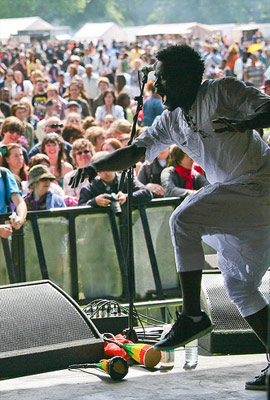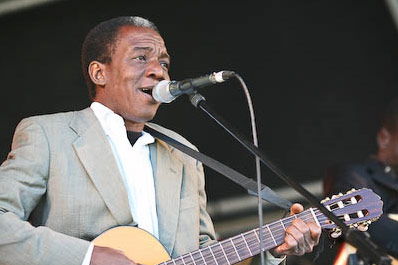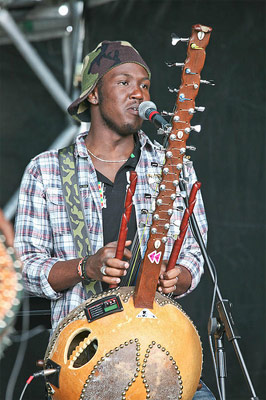
| HOME |
| NERVE |
| REVIEWS |
| ARCHIVE |
| EVENTS |
| LINKS |
| ABOUT US |
| CONTRIBUTORS |
| BACK ISSUES |
| CONTACT US |
 Africa
Oye 2010
Africa
Oye 2010
Review Field, Sefton Park
19th-20th June 2010
Reviewed by Richard
Lewis
Photos by Keith
Ainsworth
Heading down Lark Lane, it seems slightly improbable that a major music festival is taking place mere minutes away. The thoroughfare looks much as it does on any Saturday afternoon, albeit with a marked improvement in the weather. One noticeable change however is that almost everyone is heading towards Sefton Park.
Taking place in the Review Field with the festival’s stalls arranged almost as a wagon train to form the perimeter, expectations that this year’s Africa Oye would surpass the twenty thousand revellers it attracted last year are more than easily met. By four pm the field is packed full. With no fences, checkpoints or searches to be navigated, the event is genuinely open to all.
First band onstage today, Les Espoirs de Coronthie from Conakry, Guinea turn in an extremely tight set, their long tracks and call and response routines winning the audience over. All the songs are driven by the marimba, a wooden African xylophone, complemented by mandolin and African drums.
Next onstage, Haitians Ti Coca are a completely different proposition. Evoking the spirit of Creole music - the melting pot of genres found on Haiti and New Orleans - their accordion swell and plucked banjo displays the lineage of the French settlers on the region. The addition of the African drums and maracas that form their rhythm section point up the African element of their sound.
 Wandering
around the site between sets, the newly-minted Health and Wellbeing tent
- making its debut after a trial run last year - is extremely well attended.
Featuring people taking part in admirably non-self-conscious dancing,
the tent also includes a drumming workshop. Taking place between the acts
onstage, the tent featured participants of all ages enthusiastically playing
African drums to a bandleader counting out the time.
Wandering
around the site between sets, the newly-minted Health and Wellbeing tent
- making its debut after a trial run last year - is extremely well attended.
Featuring people taking part in admirably non-self-conscious dancing,
the tent also includes a drumming workshop. Taking place between the acts
onstage, the tent featured participants of all ages enthusiastically playing
African drums to a bandleader counting out the time.
Entertaining the sweltered audience between set-ups, a dub inflected cover of Sgt. Pepper is played over the PA, the entire 1967 album relocated from the suburbs of London and Liverpool to Kingston, Jamaica. An inspired choice, the LP prepares the ground for Victor Deme from Burkina Faso.
Taking to the stage the band launches into an a cappella chant, before moving onto acoustic guitar and percussion. Drawing the biggest crowd of the day, with the music and the weather blending seamlessly, Deme entertains the audience with a wildly eclectic hour long set. His band are remarkable, most notably an excellent lead guitarist who can switch from flamenco style finger picking to folky arpeggios and onto bluesy rock guitar sometimes within the space of the same song. With some tracks sounding like English folk music typified by the likes of Bert Jansch, and others incorporating elements of rock and blues, the set is the most musically varied of the day.
 Deme’s
performance also boasts the feature of the front rows of the crowd being
well acquainted enough with the material to sing along to several of the
tracks. Parts of the set sound vaguely reminiscent of Dave Gilmour’s
guitar led passages for early 1970s Pink Floyd, as the band glance off
psychedelic rock. With applause for the performance going well beyond
the arena between the stage front and the sound desk, Victor Deme is the
undoubted highlight of the day.
Deme’s
performance also boasts the feature of the front rows of the crowd being
well acquainted enough with the material to sing along to several of the
tracks. Parts of the set sound vaguely reminiscent of Dave Gilmour’s
guitar led passages for early 1970s Pink Floyd, as the band glance off
psychedelic rock. With applause for the performance going well beyond
the arena between the stage front and the sound desk, Victor Deme is the
undoubted highlight of the day.
The final set of the day is supplied by Boukmar Eksperyans, a seven-piece Haitian group. The only band of the day to use a drumkit, the group fittingly have the biggest sound, their deep basslines booming out over the crowd. Beginning with a wah-wah guitar intro strongly reminiscent of Isaac Hayes’ ‘Shaft’ soundtrack, the group shift focus into a dub track with the chorus “We don’t want no war”. Blurring several genres and styles, a spiritual sung in Creole performed a cappella displays the strength of the group’s vocal harmonies, and highlights a trademark element of their sound. Following on from a short dedication to Liverpool, the band play a short piano elegy, which shape-shifts into a dub-reggae fusion.
Although the crowd has thinned slightly, the audience still stretches into several thousands by eight. Figures later confirm the audience for the festival on the Saturday alone was 25,000 - beating 2009’s record for the entire weekend. A massive success, Africa Oye is now one of the biggest outdoor events to be held in the city, second only to the Mathew Street festival in the musical calendar.